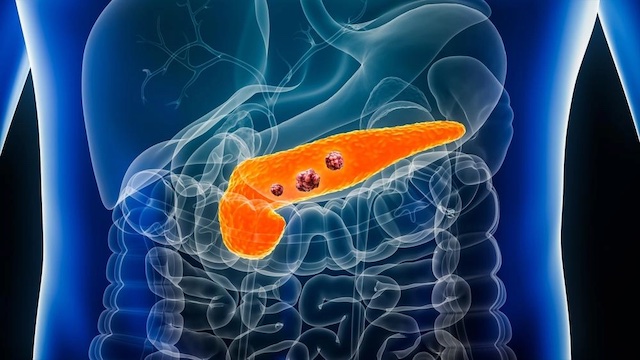 Pancreatic cancer can present with symptoms often associated with other illnesses — following the trail of such signs early on could help with early diagnosis.
Pancreatic cancer can present with symptoms often associated with other illnesses — following the trail of such signs early on could help with early diagnosis.
Pancreatic cancer is a highly fatal disease, its early signs often overlooked, resulting in many patients being diagnosed in the advanced stages. To raise public awareness, we have explored actual patient cases to help identify the early signs of pancreatic cancer.
~ The Elusiveness of Pancreatic Cancer ~
Due to the elusive nature of its initial symptoms, pancreatic cancer often goes undetected in its early stages. By the time it is diagnosed, the cancer has already spread to surrounding tissues or other organs, making it an advanced-stage disease that cannot be surgically removed. Treatment for advanced pancreatic cancer includes chemotherapy, radiation therapy, and immunotherapy, which aim to manage symptoms and slow cancer progression, but these approaches do not offer a cure. Surgery remains a potential treatment option for pancreatic cancer when it is detected very early, in a localized state.
The combined percentage of all patients living five years after diagnosis is only 12 percent. Patients diagnosed with advanced pancreatic cancer typically survive for around one year post-diagnosis. For those diagnosed before the tumor has grown extensively or spread, the average survival time is three to 3.5 years. About 10 percent of patients who receive an early diagnosis of pancreatic cancer can be cured after treatment.
Early detection of pancreatic cancer is vital for treatment and prognosis.
~ Case Analyses of Early Symptoms ~
The following four clinical cases illustrate the potential early signs of pancreatic cancer.
Case 1: Symptoms Resembling Diabetes
Mr. Lee, 58 years old, had previously been diagnosed with Type 2 diabetes and was undergoing treatment. Despite having no family history and maintaining regular lifestyle habits, he suddenly developed symptoms of diabetes, such as excessive thirst, frequent urination, and significant weight loss.
Later, he came to me seeking treatment for lower back pain, hoping to alleviate it through traditional Chinese medicine (TCM) acupuncture. However, during the treatment, I noticed that he had very mild jaundice, so I suggested that he see an internal medicine doctor.
After examination, it was found that Mr. Lee did not have diabetes or a herniated lumbar disc, but rather early-stage pancreatic cancer. His pancreatic tumor was close to the gallbladder, which caused him to develop jaundice.
A review published in BMJ in 2015 found a strong linear dose-response relationship between fasting blood sugar concentration and the incidence of pancreatic cancer in the range of prediabetes and diabetes. For every 0.56 millimoles per liter increase in fasting blood sugar concentration, the incidence of pancreatic cancer increased by 14 percent.
This case emphasizes the need to be vigilant if a middle-aged person suddenly develops symptoms of diabetes without any family history or unhealthy lifestyle habits, as this could be an early sign of pancreatic cancer.
Case 2: Fatigue and Depression
Ms. Wong, 45 years old, was cheerful and enjoyed a harmonious family life with no health issues. However, she began experiencing fatigue and emotional lows, lacking the energy for any activities. At times, she felt deeply saddened, even becoming tearful.
Story continues below advertisement
Suspecting she might be experiencing symptoms of depression, she visited a psychiatrist. Upon examination, it was confirmed that she exhibited all the typical signs of depression—reduced appetite, weight loss, fatigue, difficulty concentrating, lack of interest in activities, and insomnia. Therefore, she was prescribed antidepressant medication, however, there was no improvement. She also tried psychotherapy, but the psychiatrist could not identify any specific psychological cause.
Some of Ms. Wong’s symptoms raised our concern. She often experienced abdominal pain, which, although not severe, radiated to the surrounding areas. Additionally, she developed severe acid reflux and experienced bloating in the abdomen.
In such cases, it is important to consider the possibility of other factors causing depression, one of which may be a tumor. The presence of a tumor can lead to the production of inflammatory cytokines. This can, in turn, affect the metabolism of neurotransmitters in the brain, including serotonin and adrenaline, both of which play a role in regulating mood. Furthermore, tumors can activate certain neuroinflammatory cells, leading to a rapid increase in stress response affecting the brain and adrenal glands, thereby raising the risk of depression.
After a series of examinations, Ms. Wong was diagnosed with pancreatic cancer. Fortunately, it was discovered relatively early, and she underwent a partial resection surgery, which successfully treated her cancer.
A study published in the journal Molecular Psychiatry in 2019 indicated that clinically diagnosed depression and anxiety were associated with a higher incidence of cancer, poorer cancer survival rates, and higher cancer-specific mortality rates. Another study suggested that pancreatic cancer patients were most likely to have concurrent depression and anxiety, and there appeared to be a biological connection. In some patients, depression may be a precursor to pancreatic cancer.
This suggests that when someone experiences unexplained depression, particularly if accompanied by digestive symptoms and a family history of hereditary diseases, the possibility of having a tumor should be considered.
Case 3: Diarrhea and Constipation
Mr. Wang, 60 years old, had been in good health. However, he recently developed chronic diarrhea, with occasional constipation. The presence of both diarrhea and constipation indicates irritable bowel syndrome, a condition often associated with mood swings and psychological stress. However, Mr. Wang did not report any emotional issues.
Therefore, we advised him to undergo further examination to investigate any other potential issues. During a colonoscopy, a localized obstruction in his intestines was found, caused by a tumor originating from the pancreas. Given the early detection, prompt surgical intervention followed by additional treatments is expected to yield a favorable prognosis.
Chronic gastrointestinal issues should be taken seriously if they persist without improvement. It is particularly crucial to observe if the stool is black, as it could indicate potential bleeding or anemia, warranting closer attention to the possibility of a tumor.
 Case 4: Unhealthy Diet
Case 4: Unhealthy Diet
Mr. Zhang was obese due to his longstanding unhealthy eating habits, which included a preference for fried foods, sugary drinks, meats, and sweets, as well as prolonged periods of inactivity. Recognizing the health risks associated with obesity, he decided to improve his diet. After starting a healthier diet, he experienced rapid weight loss. However, he noticed that he had become somewhat underweight after some time. He also experienced a decreased appetite, pronounced fatigue, low mood, and decreased energy levels. Mr. Zhang went to the hospital for tests but found no specific reasons for his symptoms.
After experiencing sudden abdominal cramps, he went to the emergency room, where a CT scan revealed a pancreatic mass, later diagnosed as pancreatic cancer.
One study indicated that obesity may increase the risk of pancreatic cancer through various mechanisms, including inflammation, insulin resistance, and changes in the microbiome.
Long-standing unhealthy habits may increase the risk of developing tumors. Recognizing the need for lifestyle changes sooner rather than later is essential. Of course, other genetic factors should also be taken into consideration.
~ Symptoms Summary for Potential Pancreatic Cancer ~
The cases above remind us to stay vigilant about the possibility of pancreatic cancer if the following symptoms arise:
* Sudden increases in blood sugar
* Unexplained depression
* Rapid weight loss
* Unexplained fatigue
* Abdominal or back pain
* Persistent gastrointestinal issues
Early detection and treatment are crucial in fighting pancreatic cancer. I hope this article serves as a helpful reminder to everyone.
~ Reference for YOUR Consideration ~
Dr. Kelley is In! ~ The Man Who Beat Pancreatic Cancer
Written by Jingduan Yang for Epoch Health ~ April 26, 2024

